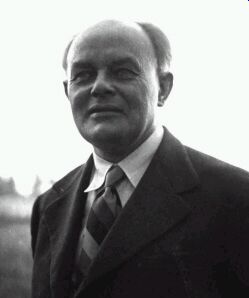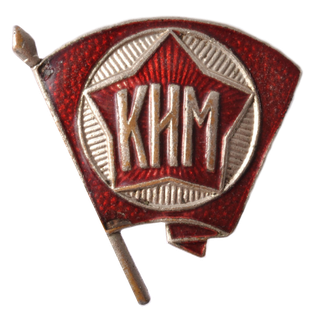Related Research Articles

The Communist International (Comintern), also known as the Third International, was an international organization founded in 1919 that advocated world communism, and which was led and controlled by the Communist Party of the Soviet Union. The Comintern resolved at its Second Congress in 1920 to "struggle by all available means, including armed force, for the overthrow of the international bourgeoisie and the creation of an international soviet republic as a transition stage to the complete abolition of the state". The Comintern was preceded by the dissolution of the Second International in 1916. Vladmir Lenin and Leon Trotsky were both honorary presidents of the Communist International.

Council communism or Councilism is a current of communist thought that emerged in the 1920s. Inspired by the November Revolution, council communism was opposed to state socialism and advocated workers' councils and council democracy. It is regarded as being strongest in Germany and the Netherlands during the 1920s.

The Workers' Socialist Federation was a socialist political party in the United Kingdom, led by Sylvia Pankhurst. Under many different names, it gradually broadened its politics from a focus on women's suffrage to eventually become a left communist grouping.

The Red International of Labor Unions, commonly known as the Profintern, was an international body established by the Communist International (Comintern) with the aim of coordinating communist activities within trade unions. Formally established in 1921, the Profintern aimed to act as a counterweight to the influence of the so-called "Amsterdam International", the social-democratic International Federation of Trade Unions, an organization which the Comintern branded as "class-collaborationist" and as an impediment to revolution. After entering a period of decline in the middle 1930s, the Profintern was finally dissolved in 1937 with the advent of Comintern's "Popular Front" policy.

The Communist Workers' Party of Germany was an anti-parliamentarian and left communist party that was active in Germany during the Weimar Republic. It was founded in 1920 in Heidelberg as a split from the Communist Party of Germany (KPD). Originally the party remained a sympathising member of Communist International. In 1922, the KAPD split into two factions, both of whom kept the name, but are referred to as the KAPD Essen Faction and the KAPD Berlin Faction.

Karl Heinrich Otto Rühle was a German Marxist active in opposition to both the First and Second World Wars as well as a council communist theorist.

The International Association of Red Sports and Gymnastics Associations, commonly known as Red Sport International (RSI) or Sportintern was a Comintern-supported international sports organization established in July 1921. The RSI was established in an effort to form a rival organization to already existing "bourgeois" and social democratic international sporting groups. The RSI was part of a physical culture movement in Soviet Russia linked to the physical training of young people prior to their enlistment in the military. The RSI held 3 summer games and 1 winter games called "Spartakiad" in competition with the Olympic games of the International Olympic Committee before being dissolved in 1937.

The 2nd World Congress of the Communist International was a gathering of approximately 220 voting and non-voting representatives of communist and revolutionary socialist political parties from around the world, held in Petrograd and Moscow from July 19 to August 7, 1920. The 2nd Congress is best remembered for formulating and implementing the 21 Conditions for membership in the Communist International.
The 1st Congress of the Communist International was an international gathering of communist, revolutionary socialist, and syndicalist delegates held in Moscow which established the Communist International (Comintern). The gathering, held from March 2 to 6, 1919, was attended by 51 representatives of more than two dozen countries from around Europe, North America, and Asia.
During the period of the Second International several International Socialist Women's Conferences were held by the representatives of the women organizations of the affiliated Socialist parties. The first two were held in conjunction with the main International Congresses of the Second International, while the third was held in Berne in 1915. The Conferences were notable for popularizing International Women's Day and were forerunners of groups like the Socialist International Women and the Women's International Democratic Federation.

"Left-Wing" Communism: An Infantile Disorder is a work by Vladimir Lenin attacking assorted critics of the Bolsheviks who claimed positions to their left. Most of these critics were proponents of ideologies later described as left communism. The book was written in 1920 and published in Russian, German, English and French later in the year. A copy was then distributed to each delegate at the 2nd World Congress of the Comintern, several of whom were mentioned by Lenin in the work. The book is divided into ten chapters and an appendix.

Left communism, or the communist left, is a position held by the left wing of communism, which criticises the political ideas and practices espoused by Marxist–Leninists and social democrats. Left communists assert positions which they regard as more authentically Marxist than the views of Marxism–Leninism espoused by the Communist International after its Bolshevization by Joseph Stalin and during its second congress.
A workers' council, or labor council, is a type of council in a workplace or a locality made up of workers or of temporary and instantly revocable delegates elected by the workers in a locality's workplaces. In such a system of political and economic organization, the workers themselves are able to exercise decision-making power. Furthermore, the workers within each council decide on what their agenda is and what their needs are. The council communist Antonie Pannekoek describes shop-committees and sectional assemblies as the basis for workers' management of the industrial system. A variation is a soldiers' council, where soldiers direct a mutiny. Workers and soldiers have also operated councils in conjunction. Workers' councils may in turn elect delegates to central committees, such as the Congress of Soviets.

The Second International (1889–1916) was an organisation of socialist and labour parties, formed on 14 July 1889 at two simultaneous Paris meetings in which delegations from twenty countries participated. The Second International continued the work of the dissolved First International, though excluding the powerful anarcho-syndicalist movement. While the international had initially declared its opposition to all warfare between European powers, most of the major European parties ultimately chose to support their respective states in World War I. After splitting into pro-Allied, pro-Central Powers, and antimilitarist factions, the international ceased to function. After the war, the remaining factions of the international went on to found the Labour and Socialist International, the International Working Union of Socialist Parties, and the Communist International.

The International Workingmen's Association (IWA), often called the First International (1864–1876), was an international organisation which aimed at uniting a variety of different left-wing socialist, social democratic, communist and anarchist groups and trade unions that were based on the working class and class struggle. It was founded in 1864 in a workmen's meeting held in St. Martin's Hall, London. Its first congress was held in 1866 in Geneva.

The Young Communist International was the parallel international youth organization affiliated with the Communist International (Comintern).

The Executive Committee of the Communist International, commonly known by its acronym, ECCI (Russian acronym ИККИ - for Исполнительный комитет Коммунистического интернационала), was the governing authority of the Comintern between the World Congresses of that body. The ECCI, established by the Founding Congress of the Comintern in 1919, was dissolved with the rest of the Comintern in May 1943.

Marjory Newbold was a leading Scottish socialist and communist, prominent in the Independent Labour Party and in the 'Red Clydeside' movement demanding reforms for the working class. Newbold organised pacifist and Marxist activism in 1917–1920s across the UK, and was one of the first British people to visit Russia after the revolution when she travelled incognito into Russia with delegates including Sylvia Pankhurst, to the Second World Congress of the Comintern.
References
- ↑ Mike Milotte in Communism in Modern Ireland: The Pursuit of the Workers' Republic Since 1916 lists two delegates, Eadmon MacAlpine and Roddy Connolly. MacAlpine is here also listed as a delegate of the Communist Labor Party of America.
- ↑ Maurseth, Per (1987). Gjennom kriser til makt 1920-1935. Volume three of Arbeiderbevegelsens historie i Norge (in Norwegian). Oslo: Tiden. p. 139. ISBN 82-10-02753-0.
- ↑ Bourrinet, Philippe (2018). The Dutch and German Communist Left (1900-1968): 'Neither Lenin Nor Trotsky Nor Stalin!' - 'All Workers Must Think for Themselves!' (PDF). Haymarket Books. ISBN 978-1-60846-821-8.
- ↑ Rahlan, O.P. (ed.). Encyclopedia of Political Parties - Indian - Pakistan - Bangladesh - National - Regional - Local - Vol. 13 All India Trade Union Congress . New Delhi: Anmol Publications, 1997. p. 116
- ↑ M.V.S. Koteswara Rao. Communist Parties and United Front - Experience in Kerala and West Bengal. Hyderabad: Prajasakti Book House, 2003. p. 109
R.A. Archer (trans.), Second Congress of the Communist International: Minutes of the Proceedings [in two volumes]. (London: New Park Publications, 1977), v. 2, pp. 297–326.